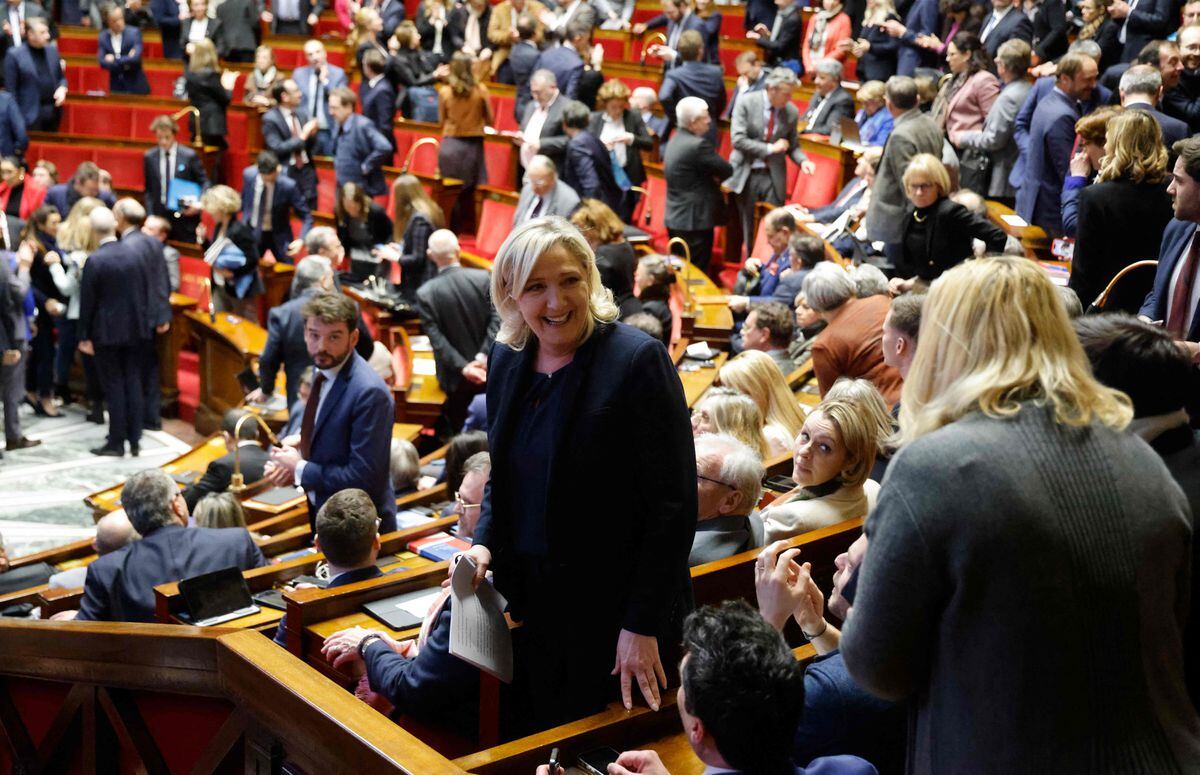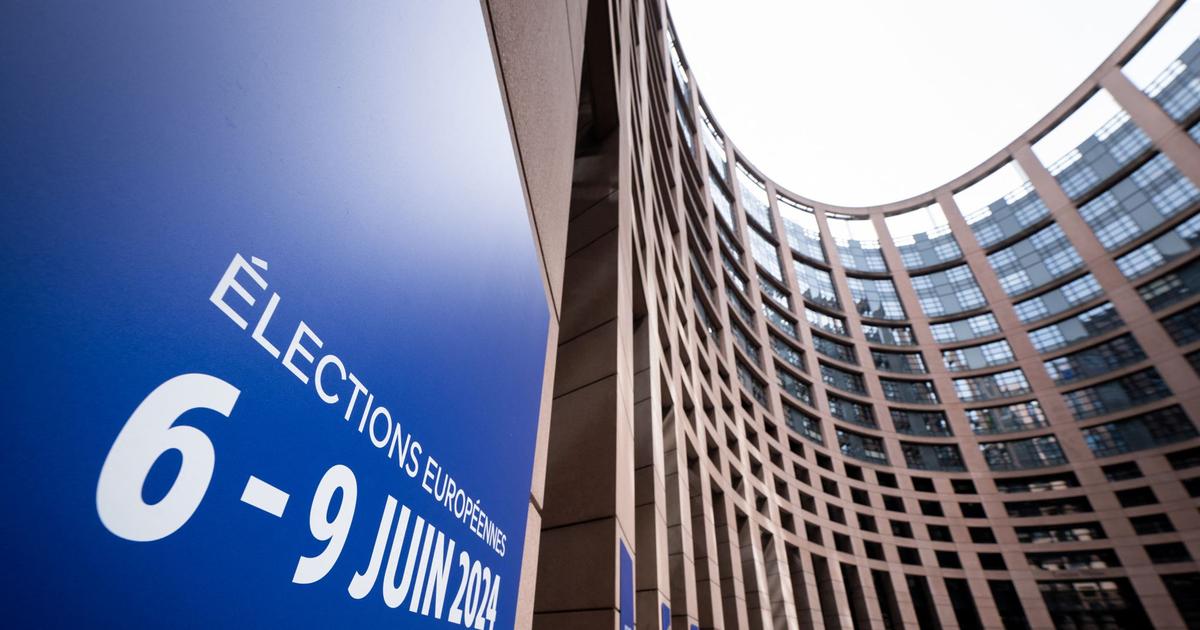The fight for the unpopular pension reform clarifies the political landscape in France.
In a provisional balance, the one who can benefit the most from the unrest is the leader of the extreme right and the first opponent of President Emmanuel Macron, Marine Le Pen, according to various polls and experts.
She has achieved it with a frontal opposition to the reform, but, unlike the anti-capitalist and eurosceptic left of La Francia Insumisa, without getting involved in the protests or making high-sounding statements, and with an institutional position in parliamentary debates.
"I would say that, rarely taking a position and without speaking too much, [the political winner] is the National Regroupment," sums up Frédéric Dabi, general director of Opinion at the Ifop polling institute, alluding to Le Pen's party.
And he adds: “He has allowed La Francia Insumisa to be a kind of protest force;
and they have wrapped themselves in the tunic of the alternative”.
Meanwhile, the government is dominated by cacophony and the Prime Minister, Élisabeth Borne, has proved incapable of persuading public opinion, mostly opposed to the project, of the need to extend working life to guarantee the viability of the public pension system .
Laurent Berger, general secretary of the moderate CFDT union, warns: "There will be a democratic problem, clearly, there will be a democratic malaise if this reform is adopted like this."
The protests against the reform to increase the retirement age from 62 to 64, now under discussion in the Senate, took to the streets on Tuesday 1.3 million people throughout France, 3.5 according to the CGT union.
It was the sixth day of strikes and demonstrations since the Government presented the project in January.
The transport and refinery strikes continued on Wednesday.
The legislative calendar sets the end of March as the deadline for adopting the law.
Macron has the first parliamentary group in the group of deputies in the National Assembly, but they do not reach an absolute majority.
He needs the moderate right of Los Republicanos.
If he does not obtain a majority, he could resort to article 49.3 of the Constitution, which allows parliamentary debates to end and adopt the law without a vote.
a risky bet
The bet, in any case, is risky.
By imposing the reform with 70% of the French against it and with a meager parliamentary majority, the French president risks creating a “democratic problem”, the main French union leaders warned this week in statements to EL PAÍS.
"I find it hard to believe that, if this form is adopted under current conditions, there will not be resentment in the population and especially in the world of work," says Berger, head of the CFDT, the country's first union.
“It is starting to show.
And we all know that resentment is not good for democracy."
Philippe Martinez, outgoing general secretary of the CGT union, agrees: “In all European countries, when there are mobilizations like these, the government says: 'We must discuss.'
Here it is done as if nothing happened ”.
And he adds: “If the reform is adopted in Parliament, it is a problem, taking into account millions of people in the demonstrations and 92% of the workers against it.
Who do the deputies represent?
To themselves?
Or to the town?
It is a democratic problem.
And when there is a democratic problem, we must continue with the demonstrations, until we are heard”.
Macron and his supporters risk getting hit hard by this reform.
But neither does the left, which has championed the opposition in Parliament, seem to benefit.
The France Unsubmissive (LFI) of Jean-Luc Mélenchon —the first party on the left, which controls the coalition with socialists, ecologists and communists— flooded the debate in the National Assembly with thousands of amendments that prevented a vote on it within the established deadline.
And irritated his allies.
"Jean-Luc Mélenchon does not favor the clarity of debates and positions," Martinez, from the CGT, criticized in February.
According to an Ifop survey, the unions embody the opposition to the pension reform better than the parties.
But, if you ask about the leaders, 46% of French believe that it is Le Pen who best represents the
no
to the reform, followed by Mélenchon, with 43%.
When asked which opposition politician is closest to their overall concerns, Le Pen beats Mélenchon by 34% to 23%.
Le Pen reached the second round of the presidential elections in 2017 and, although he lost, he obtained more than 13 million votes.
Abstention reached its highest level in half a century, 28%, evidence of the disinterest of a large part of the electorate.
Macron's willingness to impose reform against all odds can be understood as a matter of conviction and responsibility: he knows that he is unpopular, but he believes that it is necessary for France and, therefore, he is willing to bear the costs.
But also, as the trade unionists point out, it can be interpreted in another way: as a question of democratic consent.
Can you govern with the country against you?
And what risks does it entail?
chaos and revolution
For Frédéric Souillot, Secretary General of Force Ouvrière, if Macron opts for the decree, "it will be chaos and revolution."
And he specifies: “All the people who are demonstrating, if they are told tomorrow that this reform is imposed on them without voting for it in Parliament, they are going to radicalize.
You cannot manage a country against all the trade union organizations and a majority of the French against it.
It is dangerous for the country and for social cohesion”.
Faced with the questioning of the democratic legitimacy of the reform, Macron can argue that less than a year ago he was re-elected before Le Pen, and comfortably.
And he won without hiding the cards, promising to raise the retirement age.
He then said he was 65 years old: the proposal has reduced the age to 64.
"There are two legitimacies here," says Dabi, from Ifop.
“There is the legitimacy of the polls, and it must be said that Macron got five million votes from Le Pen.
And there is this more fizzy form of legitimacy of the social movement.”
Dabi points out that "rarely" has such a broad rejection of a government initiative been seen.
The number of protesters is unprecedented in recent decades.
They also bring together people from different social classes and ideologies.
At the same time, the expert specifies, a majority of French people have resigned themselves: he believes that the reform will end up being approved.
This is an advantage for the president.
The “democratic red line”, he adds, would be for Macron to resort to article 49.3 and evade the vote.
Macron begins to experience what in the United States is known as the
lame duck syndrome
: the president who cannot be re-elected and therefore loses authority.
In 2027 he ends his second five-year period, and cannot run again.
"If the reform is adopted, there will be a lot of resentment, which will add to the anger," Dabi analyzes.
"And it will pay off: on the street, perhaps with a movement like that of the
yellow vests
, in the 2024 European elections, in the Senate elections."
And in the presidential elections?
"Four years to go, nobody knows what can happen," he says.
"Let's be prudent."
Follow all the international information on
and
, or in
our weekly newsletter
.
Subscribe to continue reading
Read without limits
Keep reading
I'm already a subscriber









